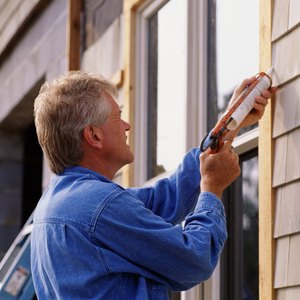
Most home buyers take out mortgage loans to cover the purchase price of their new homes. But if you're buying a home that needs significant repairs, you might want to take out a mortgage loan in an amount higher than your home's sale price. Maybe the home you want to buy needs a new roof and a major kitchen overhaul. Instead of taking out a loan for the sale price, you'll take out a loan for $20,000 above it so that you have cash on hand to pay for these expensive repairs. Fortunately, there is a program for doing this offered through the U.S. Department of Housing and Urban Development's Federal Housing Administration.
Review the FHA 203(K) Loan
Borrowers seeking to finance both the purchase of a home and its repairs can rely on the 203(k) program offered by the Federal Housing Administration. The FHA designed this program solely to help homeowners purchase and rehab homes in need of significant repairs. Under the program, the dollars to be used for repairs are placed in an escrow account. Your mortgage lender will then release these dollars to licensed contractors after they complete your home's repairs.
To qualify for this program, you'll need to come up with a down payment of 3.5 percent of the total amount of the home's purchase price and repair costs. You also must live in the home; you can't take out a 203(k) loan for a home that you intend to use as an investment property. Note, too, that the FHA doesn't originate mortgage loans. It only insures them. To apply for a 203(k) loan, you'll have to work with a mortgage lender that deals with FHA-insured loans.
Know Your Debt-to-Income Ratio
No matter how large a loan you seek, you'll have to meet certain income limits. Doing this becomes more challenging the more you want to borrow. Most lenders, even if participating in the FHA 203(k) program, require that your total monthly expenses -- including your estimated new monthly mortgage payment -- consume no more than 36 percent of your gross monthly income, your income before taxes are taken out. This is known as your back-end debt-to-income ratio. If you want to apply for a loan higher than your home's sales price through the 203(k) program, your ratio will still have to be at 36 percent or lower.
Credit Scores Play an Important Role
Lenders pay particular attention to credit scores. Most lenders consider scores of 740 or higher on the FICO credit-scoring scale to be good scores, indicative of borrowers who pay their bills on time. You'll need a score like this to persuade lenders to loan you a mortgage in an amount higher than your home's sales price.
If you are applying for a 203(k) loan, the FHA is only providing insurance on that loan. You'll still have to work with a mortgage lender to originate your loan, and you'll still have to meet a lender's requirements. Lenders are taking on extra risk when they lend you a larger home loan. They stand to suffer a greater financial loss if you fall behind on your payments. A high credit score provides lenders some reassurance that you'll pay back the money they lend you.
Be Prepared to Provide Paperwork
To qualify for a mortgage loan through the FHA's 203(k) program, you'll have to provide your lender documentation from licensed contractors estimating the costs of these renovations. Lenders will study these documents to determine how much money you'll need to fix your new home's sagging foundation, cracked driveway and leaking roof.
References
- U.S. Department of Housing and Urban Development: Fixer-Uppers - Homes and Houses
- Bankrate: How This FHA Loan Can Help You Repair Your Home
- Realtor.com: Mortgage Rate Trends
- Bankrate: Debt-to-Income Ratio Calculator
- Zillow: FHA 203k Loans: What Are They? What Are the Benefits?
- Federal Deposit Insurance Commission (FDIC). "203(b) Mortgage Insurance Program," Pages 21-22. Accessed Aug. 15, 2020.
- U.S. Department of Housing and Urban Development (HUD). "The Federal Housing Administration (FHA)." Accessed Aug. 15, 2020.
- Federal Reserve Bank of St. Louis. "Homeownership Rate for the United States." Accessed Aug. 15, 2020.
- Benefits.gov. "Home Equity Conversion Mortgages (HECM)." Accessed Aug. 15, 2020.
- U.S. Department of Housing and Urban Development (HUD). "203(k) Rehab Mortgage Insurance." Accessed Aug. 15, 2020.
- U.S. Department of Housing and Urban Development (HUD). "Energy Efficient Mortgage Program." Accessed Aug. 15, 2020.
- U.S. Department of Housing and Urban Development (HUD). "The Graduated Payment Mortgage Program (4240.2)." Accessed Aug. 15, 2020.
- Rocket Mortgage. "Conventional Mortgages: Everything You Need To Know." Accessed Aug. 15, 2020.
- U.S. Department of Housing and Urban Development (HUD). "Section C. Borrower Credit Analysis Overview," Page 4-C-12. Accessed Aug. 15, 2020.
- U.S. Department of Housing and Urban Development (HUD). "Section A. Borrower Eligibility Requirements Overview," Page 4-A-10. Accessed Aug. 15, 2020.
- Federal Deposit Insurance Commission (FDIC). "203(b) Mortgage Insurance Program," Pages 23. Accessed Aug. 15, 2020.
- U.S Department of Housing and Urban Development (HUD). "FHA Single Family Housing Policy Handbook 4000.1," Page 972. Accessed Aug. 15, 2020.
- U.S. Government Printing Office. "FHA Loan Affordability Act of 2019," Page 8. Accessed Aug. 15, 2020.
- Internal Revenue Service (IRS). "Publication 936 (2019), Home Mortgage Interest Deduction." Accessed Aug. 15, 2020.
- U.S. Department of Housing and Urban Development (HUD). "Section D. Borrower Employment and Employment Related Income Overview," Page 4-D-14. Accessed Aug. 15, 2020.
- U.S. Department of Housing and Urban Development (HUD). "Section F. Borrower Qualifying Ratios Overview," Page F-4-F. Accessed Aug. 15, 2020.
- U.S. Department of Housing and Urban Development (HUD). "FHA Mortgage Limits." Accessed Aug. 15, 2020.
- U.S. Department of Housing and Urban Development (HUD). "FHA Mortgage Limits." Accessed Aug. 15, 2020.
- U.S. Department of Housing and Urban Development (HUD). "Loss Mitigation Services for FHA Homeowners." Accessed Aug. 15, 2020.
Writer Bio
Don Rafner has been writing professionally since 1992, with work published in "The Washington Post," "Chicago Tribune," "Phoenix Magazine" and several trade magazines. He is also the managing editor of "Midwest Real Estate News." He specializes in writing about mortgage lending, personal finance, business and real-estate topics. He holds a Bachelor of Arts in journalism from the University of Illinois.

